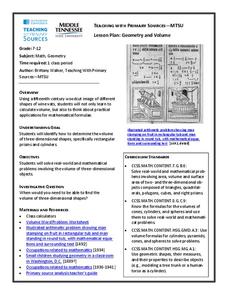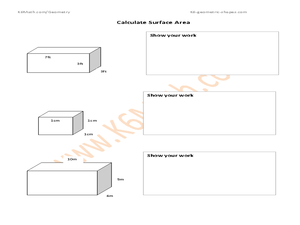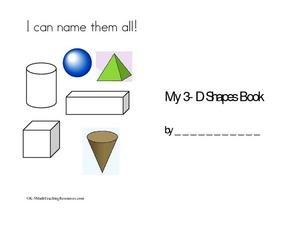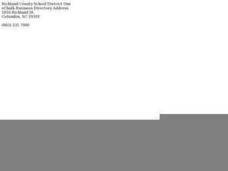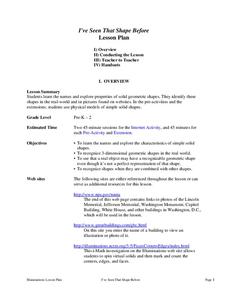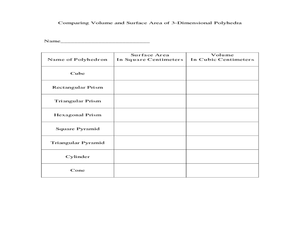Curated OER
Volume & Candy Creations Model
Sixth graders investigate surface area. In this surface area instructional activity, 6th graders design a box of candy that has a volume of 30 cubic inches. Students are trying to minimize surface area while keeping volume constant. ...
California Education Partners
Yum Yum Cereal
Design an efficient cereal box. Scholars use set volume criteria to design a cereal box by applying their knowledge of surface area to determine the cost to create the box. They then determine whether their designs will fit on shelves,...
Curated OER
TE Activity: The Boxes Go Mobile
Students create a mobile of boxes and cubes that they made in a previous lesson that can be accessed from this page. They design the mobile using method that an engineer would use to balance the items based on surface areas and volumes.
Curated OER
Properties of 3-D Shapes
In this properties of 3-D shapes worksheet, students fill in a chart that describes 5 shapes such as a cube, a rectangular prism, and a cylinder. They tell if the shape is a prism, and how many faces, edges, and vertices it has.
Virginia Department of Education
Surface Area and Volume
Partners use materials to wrap three-dimensional objects to determine the formula for surface area. The groups use an orange to calculate the amount of peel it takes to completely cover the fruit. Using manipulatives, individuals then...
Virginia Department of Education
Geometry and Volume
The history of math is fascinating! Utilize a woodcut primary source image from 1492 and posters from the 1930s to help geometers apply their volume-calculation skills to real-life questions.
Houghton Mifflin Harcourt
Unit 3 Math Vocabulary Cards (Grade 1)
Reinforce math vocabulary with a set of flashcards. Each card showcases a boldly typed word or a picture representation with labels. The topics are geometry related and include terms such as cones, faces, pyramids, sides, and more!
Del Mar College
Formulas for Elementary and Intermediate Algebra
Give your scholars the support they need to work with formulas. A reference page offers definitions and picture examples of perimeter, area, surface area, volume, the Pythagorean theorem, a variety of shapes, and more.
Curated OER
Volume
In this finding volume practice worksheet, learners sharpen their problem solving skills as they solve six story problems.
Curated OER
Calculate Surface Area Worksheet
Learners calculate the surface area of three rectangular prisms, including a cube, based on given dimensions. There are only three diagrams with which to work. Nice homework, as it provides practice, but isn't too much busy work or...
Curated OER
Geometry: Calculating Volumes
In this volume worksheet, students find the volume of 8 prisms. Students are given the length, width, and height of each prism.
Curated OER
Geometric Shapes: Shapes in Everyday Items
Which item is shaped like a cone? Use this multiple-choice shape recognition worksheet to give students access to shapes in their everyday life. Four questions ask scholars to identify which of the pictured items is shaped like a sphere,...
Curated OER
I Can Name Them All!
Six 3-D shapes are featured in this figure-recognition book template. As they create a "My 3-D Shapes Book," young scholars place shapes on the appropriate pages, which already have text indicating the shape and its color. Although it is...
Curated OER
Castles On The Ground (2D & 3D Shapes)
Explore the relationship between 2D and 3D shapes by having your class view representation of shapes and investigate their symmetry. They will create a solid object from diagrams and describe the reflection or rotational symmetry. In the...
101 Questions
Building Boxes
Build foundational knowledge of volume by building boxes. Given dimensions for a piece of grid paper, young mathematicians determine the number of possible open-top boxes it will make. As part of this task, they also find the box with...
Mathed Up!
Nets, Plans, and Elevations
A dimensional resource teaches viewers to recognize 2-D views of 3-D objects and how to match nets with their 3-D figures. Individuals draw different views of three-dimensional objects including views from the front, side elevations and...
Houghton Mifflin Harcourt
Unit 6 Math Vocabulary Cards (Grade 5)
Acute angles, nets, and vertices are only a few terms that a set of flash cards includes. Among the 108 cards, two types are available; word cards printed in bold-faced lettering, and corresponding definition cards equipped with an...
Curated OER
Surface Area of Rectagular Prisms
Sixth graders investigate the area of polygons. For this geometry lesson, 6th graders calculate area of prisms using geometric formulas. They work with prisms and other rectangular shapes.
Curated OER
Volume Worksheet I
In this volume worksheet, students recognize three-dimensional figures, identify the proper volume formula, and then solve the equation by inserting information from a diagram into the formula. Students solve six equations.
K12 Reader
Identifying Geometric Solids
After reading a short passage that identifies different types of geometric solids, kids answer a series of questions using information found in the article.
Fayetteville Public Schools
I've Seen That Shape Before
The objectives in the resource allow students to explore the characteristics of simple solid shapes. Youngsters learn to recognize the face shapes, corners, and edges that make up 3-D figures by filling in a chart. Lastly, learners look...
Scholastic
Study Jams! Solid Figures
Figure out the correct name for different three-dimensional shapes by watching the presentation on solid figures. Go through the main figures and read about the characteristics of each. Finish the topic with a multiple choice online...
Curated OER
The Value of Volume
Students measure the perimeter and area of their polygons. In this geometry instructional activity, students calculate the volume and area using the correct tools. They calculate the time and temperature and the perimeter and side...
Math Worksheets 4 Kids
Solid Nets: With Tabs
Get in shape with a series of worksheets about making 3-D geometric shapes. Learners use the example at the top of the page to model their shapes, which range from a simple cube or cone to a more complicated octagonal pyramid.







